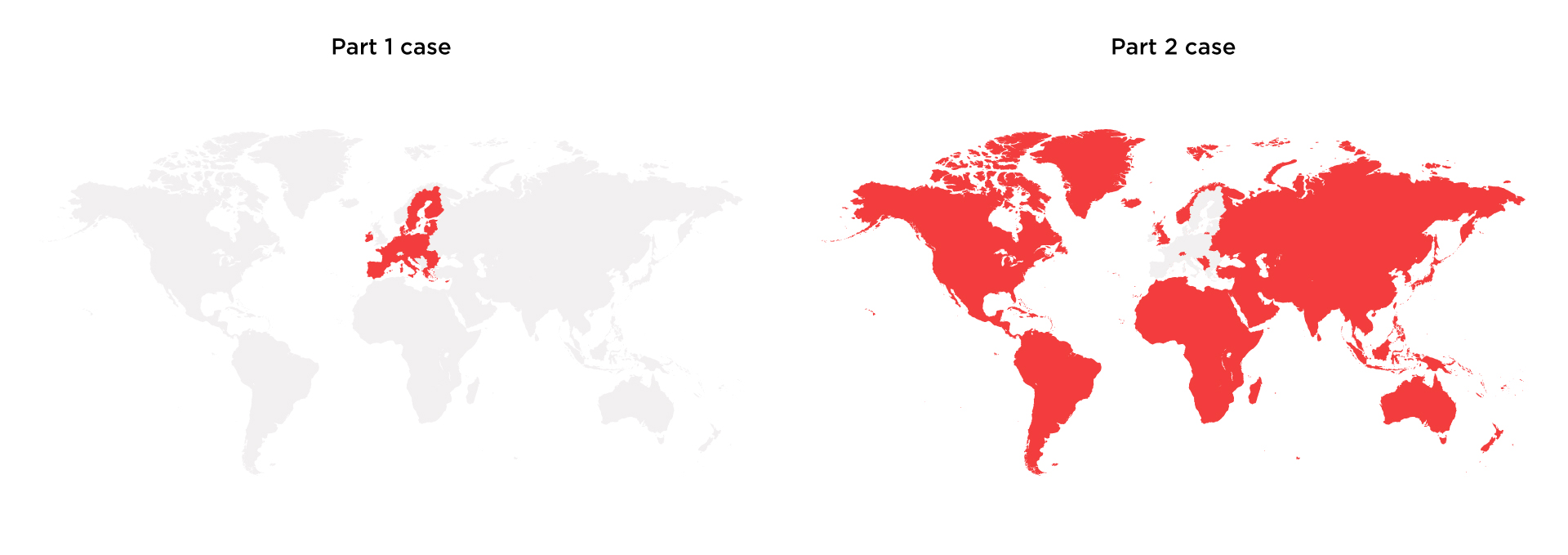Extradition – the ultimate form of interstate legal co-operation
What is Extradition?
Extradition is the process by which an individual, who is accused or convicted of a criminal offence and is wanted to stand trial or to serve a sentence, is surrendered by one country (where that individual is physically present) to the country in which he/she is wanted.

The procedure differs slightly, depending on whether extradition is sought from the UK by
- a State within the European Union (a so-called Part 1 case), or
- a State outside the European Union (a Part 2 case).

Either way, extradition is a form of mutual legal assistance (MLA article). It occurs where the UK has agreed to assist another State (usually under the terms of a treaty) to consider surrendering an individual. In this way, extradition is the ultimate form of mutual legal assistance between States, as it can lead to the physical removal of a wanted person, even if they do not consent to be transported to another country, which in itself is a severe restriction on an individual’s freedom of movement and liberty, even if they have not yet been convicted of a criminal offence in the Requesting State.
In the UK, extradition can only happen after a proper process has been followed, in which the wanted individual has an opportunity to contest (ie defend against) a request.
So how does the process of Extradition work in the UK?
The process starts with a formal request from a State. In general terms, if the State is an EU country, then a proper decision made by a judicial authority in that country is sufficient to be given effect in the UK. The National Crime Agency will deal with the practicalities of achieving this.
If the Requesting State is a Part 2 territory, then it will send an extradition request to the Secretary of State for the Home Department (the Home Office). If the extradition request meets certain requirements at this early stage, the Secretary of State will accept the request and will send the case to court.
A district judge sitting at Westminster Magistrates’ Court will consider whether or not to issue an arrest warrant for the individual (but see below). If issued, the police will execute the warrant and process the individual through a police station, including taking their fingerprints and a DNA sample.
The individual must then be brought before a judge at Westminster Magistrates’ Court. Among other matters, one very important question decided by the judge at this initial appearance at court is whether to grant the individual bail, or remand them in custody (in prison) pending the outcome of extradition proceedings, which could stretch to many months, or even years. Bail may be granted with or without conditions attached.
Subsequently, in further hearings before the court, the judge will set a timetable for the process, including a date for substantive extradition hearing and deadlines for the service of any evidence/submissions prepared by the Crown Prosecution Service (acting for the Requesting State) or on behalf of the requested individual. The nature and strength of any evidence submitted by the wanted individual will be a significant factor towards the outcome of the extradition process, and may include expert evidence.
It is important to note that the purpose of the extradition hearing is to consider whether it is fair to extradite, and not to decide the guilt or innocence of the wanted individual. Therefore, any evidence/submissions need to address that question persuasively.
Following a decision by the extradition judge, and any additional decision by the Secretary of State (if the judge decides that he/she would not discharge the individual from extradition proceedings), it is possible to appeal against the decision, if permission is first granted by the court. Ultimately, the matter could be heard by the Supreme Court on a further appeal, but only if there is a question of law of general public importance.
Throughout the process, there are often significant strategic and tactical considerations to be given when contesting extradition proceedings that can have a direct bearing on the outcome. These need to be recognised and addressed at critical moments.
What are the risks for individuals and companies?
Whilst the UK extradition process is clear, fair and well-developed, it is also built on the premise that the Requesting State is a credible authority which is worthy of the UK’s cooperation, diplomatically and judicially. Some of these States are also allowed a special dispensation from providing detailed evidence to justify their request for extradition, making the process less onerous for the Requesting State.
Yet the reality is often far from the spirit in which any extradition treaty relationship was agreed. Many extradition requests have been shown to be the extension of a deeply flawed foreign criminal process against an individual who is pursued for political reasons. In other words, there are many foreign jurisdictions where standards of the rule of law fall far below what is expected, and in that context, investigators, prosecutors and judges are vulnerable to manipulation by those who have access to political power and, therefore, are able to contrive criminal proceedings against a commercial/political opponent.
The aim of so doing may be to silence an individual and/or debilitate them to such an extent that they are unable to resist the machinery of the criminal justice system. This process is often part of a multi-faceted attack, including, for example, civil/arbitration proceedings against the individual and their business interests.
These foreign states may deploy other mechanisms to which they have access at state level, to secure evidence/information, such as through the use of mutual legal assistance and INTERPOL. The ability to use the INTERPOL system between member states for seeking information or even the detention of an individual through diffusions and notices such as a red notice, is far reaching.

INTERPOL is an international police network of more than 190 countries. Where one member state acts improperly, seeks to debilitate an individual, it has an extremely wide scope for doing so. Any individual who is the subject of a red notice, or any diffusion which seeks to do the same (i.e. the arrest and detention of an individual pending extradition proceedings) will be severely restricted from free movement across borders without a real risk of arrest.
Of concern, there are changes afoot in the UK process to bypass the need for the UK authorities to obtain a domestic arrest warrant to arrest an individual who is subject to an INTERPOL red notice and wanted by a list of trusted countries. That list is capable of expansion to cover other states in the future.
The UK extradition process is capable of identifying instances of politically-motivated/flawed extradition proceedings brought by a foreign state. Nevertheless, the starting point will be that the extradition request is made properly, and weighty defence arguments are required to demonstrate that the foreign state is using the UK extradition process for improper purposes.
Further, where the UK court acknowledges the legitimacy of defence arguments about fairness, the UK will entertain diplomatic assurances from the Requesting State on those points, even where on the global political stage, the UK faces a diplomatic battle against that state, and has even imposed sanctions.
Since the purpose of an extradition hearing is to establish whether it is fair to extradite (rather than to decide on guilt or innocence), it is all the more important to compile cogent defence evidence of a nature and strength to persuade a judge that it would be unfair to extradite.
Although the Extradition process is about the surrender of an individual, corporate entities may also be vulnerable to risk. Foreign criminal proceedings against an individual may relate to their conduct whilst in employment, or as a senior executive of the company. This might mean that parallel criminal or civil proceedings against the company emerge. These could occur whether the extradition request is from a foreign state to the UK (or vice versa), where the UK authorities carry out a domestic criminal investigation against a UK-based part of the company. The corporate entity may also be the subject of a mutual legal assistance request prior to, or alongside extradition proceedings. The risks for a corporate are likely to be even greater where criminal proceedings against the individual arise from improper motives, as they are usually part of a multi-fronted campaign of attack. The corporate entity will also need to guard against a damage to reputation.
How can those risks be mitigated?
Given the risks to individual and corporates, it is imperative that any developments in the foreign jurisdiction are monitored and any pre-emptive steps that may be taken are considered.
If these are not appropriate or possible, then key steps can be taken proactively, following action by the investigating authorities, even prior to any extradition request to (or from) the UK.
Once any extradition proceedings are commenced, securing bail will be one of the first priorities and there will be a need to meet a high evidential burden, with significant tactical considerations throughout. The ability to take these steps and the availability of arguments under the possible bars to extradition will depend on the facts of the case, and the accessibility of evidence.
Often, evidence of political motivation is difficult to obtain, owing to its nature.In cases without an obvious political motivation behind an extradition request, there may be other bases on which to contest extradition, and these need to be identified and supported.
Extradition proceedings are often highly sensitive, with a significant threat to an individual’s liberty and personal safety. Often, success in turning the tide of judicial decisions can rest on human rights arguments. Defence witnesses may fear for their own safety, and steps will need to be taken to ensure that they are protected by the extradition process, so that they are willing to give vital evidence.
In complex matters where a Requesting State is able to go to great lengths to seek the surrender of an individual, and where the mechanisms for cooperation between states are stronger than ever, the utmost care is needed to ensure every appropriate step is taken at an early stage.


